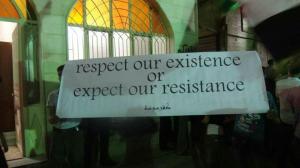Posts Tagged ‘Robert Fisk’
Translation and Conflict
Here was me, Dan Gorman and Samia Mehrez talking about translation and conflict for the Literary Translation Centre at the London Book Fair 2013.
To Kill, and to Walk in the Funeral Procession
Updated with a postscript noting Robert Fisk’s obscene pro-regime propaganda while embedded with the regime army in Daraya, and the response of the LCCs to Fisk’s nonsense.
The Syrian regime is now perpetrating crimes against humanity at a pace to match its crimes in Hama in 1982 and at the Tel Za’atar Palestinian camp in 1976. All of Syria is a burning hell. Savage aerial bombardment (such as that causing the apocalypse here in Kafranbel, which held such beautifully creative demonstrations) and continuous massacres have raised the average daily death toll to well above two hundred, most of them in Damascus and its suburbs. The other day 440 people were murdered in twenty four hours.
The worst hit area has been the working class suburb of Daraya. I visited people in Darayya some years ago, and once bought a bedroom set for a friend’s wedding in the town. I remember it as a lively, friendly, youthful place. Last year Daraya became a cultural centre of the revolution. Ghiath Matar and others developed wonderful methods of non-violent protest there. When security forces arrived to repress demonstrations, Darayya’s residents handed the soldiers flowers and glasses of water. But Matar was murdered, and Daraya has been repeatedly raided, its young men detained and tortured, its women and children shot and bombed. Nevertheless, for some months the regime was kept out of Daraya. The town ruled itself in a civilised manner, successfully keeping a lid on crime and sectarianism.
The recent pattern is already well established (remember the massacre at Houla), but this time has played out on a larger scale. The regime bombed Daraya for days, mainly from artillery stationed on the mountains overlooking Damascus. Once any armed resistance had retreated, soldiers and shabeeha militia moved in, with knives and guns. This stage reminds one of Sabra and Shatila. It seems there was a list of suspected activists and resistance sympathisers, but the field executions included old men, women and children. About three hundred bodies have been counted so far, found in the street or in basements or in family homes.
Reporting Syria
The Syrian regime’s blanket ban on journalist access has some carefully selected exceptions. Robert Fisk, for instance, who seems to be compensating for the naive anti-Syrian and pro-March 14th line in his reporting of Lebanon over the last years by treating the statements of Syrian regime figures – professional liar Boutheina Shaaban is one – with great naivety. At least he didn’t apply the ‘glorious’ epithet to her which he used to describe Walid Jumblatt’s wife. Fisk’s book on Lebanon “Pity the Nation” is a classic, his account of the massacres at Sabra and Shatila remain fresh in the mind (the blood-footed flies clambering over his notebook), and for many years he was one of the very few English-language journalists with some real knowledge of the Middle East. Sadly, his knowledge doesn’t extend to a working familiarity with Arabic. In several recent articles he has informed us that that the slogan of the Ba‘ath Party – umma arabiya wahda zat risala khalida – means ‘the mother of the Arab nation.’ In fact it means ‘one Arab nation with an eternal message’. Fisk is confusing ‘um’ – mother – with ‘umma’ – nation. It’s a rather disastrous mistake. Someone ought to tell him about it.
Nir Rosen is an excellent journalist who clearly does speak Arabic and who makes the effort to talk to ordinary people rather than just politicians and PR people. His book “Aftermath” is essential reading for anyone who wants to understand how the American occupation of Iraq catalysed an outbreak of Sunni-Shia sectarian hatred across the Arab world. His recent visit to Syria (see here and here and here and here) seems to have been both above and below regime radar. While he appears to have been smuggled in to certain locations he also interviews such regime figures as the state Mufti Hassoun – someone once known for his touchy-feely liberalism and his campaign against honour killing now making absurd threats about armies of pro-Asad suicide bombers lying low in Western countries. Unfortunately, Rosen sees Syria through the prism of Iraq’s sectarian war. He expects to find expressions of sectarian hatred, and he finds them aplenty. He can’t be blamed for making it up, because sectarian hatred certainly does exist in Syria, and because he honestly reports what people say to him. The danger of this method, however, is twofold. First, his selection of informants necessarily reinforces his bias. He does interview some pro-regime Sunni figures (like Hassoun) but chooses not to interview Alawi, Christian, Ismaili or secularist figures who support the revolution. He doesn’t consider such people to be representative of the revolution because he’s decided that the dynamic must be sectarian, even if the Ismaili town of Selemiyeh has been demonstrating for months and secularists like Suhair Atassi are very prominent in the revolution’s Coordination Committees. (Indeed, Burhan Ghalyoun, the head of the umbrella Syrian National Council, to which many demonstrations have proclaimed allegiance, is fiercely anti-clerical).



